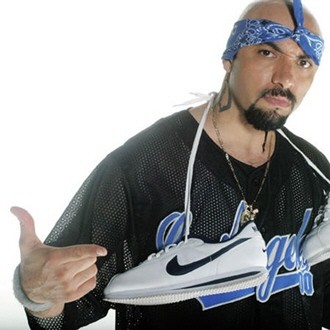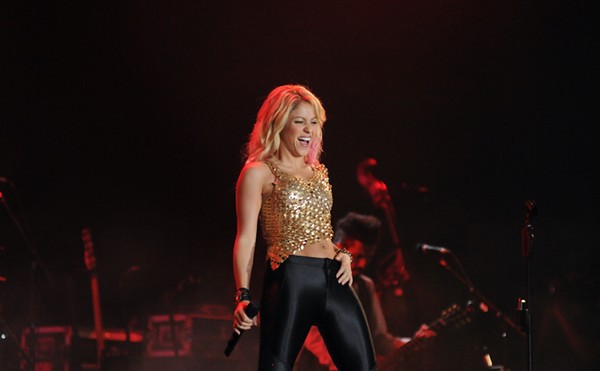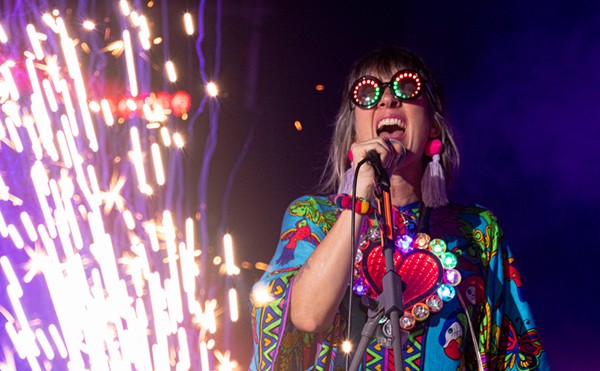| Young, gifted, and gay: rapper Deadlee fights stereotypes with the HomoRevolution Tour. Courtesy photo. |
| Homorevolution Tour: With Deadlee, Tori Fixx, Johnny Dangerous, and Qboy 8pm Thu, April 5 $10 The Saint Showbar 1430 N. Main |
Over its three-decade history, hip-hop homophobia has been so rampant, so matter-of-fact, that even the genre’s most enlightened, socially conscious artists have felt the need to take potshots. Consider Public Enemy’s gay=AIDS=murder mathematics in “Meet the G That Killed Me: “Man to man, I don’t know how they did it/ From what I know the parts don’t fit (Aw shit!).” How about Common’s “Heidi Hoe”: “Homo’s a nono, so faggots stay solo.”
While self-proclaimed morality watchdogs such as Bill O’Reilly and Bernard Goldberg broadly blame hip-hop for everything from gang violence to societal degradation of women (Paris Hilton seems to be doing fine on that score without any help from Ludacris), they show no comparable concern for homosexuals targeted by hip-hop lyrics.
Deadlee, a gay Latino rapper from Los Angeles who’s headlining HomoRevolution — an LGBT hip-hop package tour sponsored by the Alex Hinton documentary Pick Up the Mic — argues that in an era when race and ethnicity are no longer acceptable verbal targets, sexual preference is the last bastion of open ridicule.
“Even someone like Eminem, who’s white, he couldn’t pick on a black guy, so he decided to fight Christina Aguilera and gays,” Deadlee says. “They just followed society in general, ’cause society is throwing that out. Hip-hop just reflects what’s going on in society.”
Deadlee, 32, grew up in Colorado, where he attended an all-male Catholic school and was, in his words, “a little preppy boy.” He says he realized at “13 or 14” that he was gay, after avidly studying the physiques of male Olympic gymnasts on television, and asking himself why he felt compelled to watch them. When his family moved to Los Angeles, he adopted a tattooed, psuedo-gangbanger image that he now identifies as Homo Thug. It’s a look that pop-culture writer Keith Boykin referred to when he wrote about the way hip-hop culture has led to the masculinization of young gay males over the last 15 years. As Deadlee puts it, “I’m out here representing the way I am for boys who haven’t always related to the Will and Grace thing.”
Deadlee started rapping at the relatively late age of 25, and was initially convinced that he was the only openly gay emcee on the planet. But he slowly realized that a gay hip-hop subculture bubbled under the media radar, actively hoping for a Jackie Robinson, or more aptly, a Harvey Milk, who could elevate them into the big leagues.
Boykin has argued that hip-hop artists have often used slurs such as “fag” and “queer” as schoolyard taunts, without actually referring to sexual orientation. It’s an escape hatch that right-wing fire-breather Ann Coulter recently employed when she drew complaints for calling presidential contender John Edwards a “faggot.” But as Boykin recognizes, and Coulter apparently does not, the proliferation of this language feeds homophobia by legitimizing its terms.
Deadlee sounds as conflicted about these issues as his straight counterparts. He throws anti-gay epithets arounds freely in his songs, most notably with the track “No Fags Allowed,” which defines a “fag” as anyone with something to hide, and puts both Eminem and George W. Bush in that category.
“It’s funny,” he says. “I did that song one time in a gay club. I’m screaming, ‘No fags allowed, no fags allowed.’ Some people came in and were all upset. They talked to the bar owner and said, ‘Why would you have this homophobic rapper in here?’”
In 2005, Kanye West publicly condemned hip-hop’s history of homophobia (“Everybody in hip-hop discriminates against gay people. Matter of fact, the exact opposite word of hip-hop, I think, is gay”) and his friend Common has renounced his old gay-bashing rhetoric. Such developments have led to a growing media consensus that we’re seeing a cease fire in this one-sided war of words. The vitriol may be de-escalating, but we’re not seeing any hip-hop artists — West included — daring to collaborate with an out-of-the-closet performer.
Just as gay professional athletes wait until they retire (if ever) to come out, we’re unlikely to see a successful hip-hop artist go public with a multi-platinum career at stake. With his tough, stereotypically masculine look, Deadlee knows he could have hidden his sexuality, but he refused to do it.
“Maybe it would have been cooler to come out after a couple of albums, but I thought that was kinda the punk way to do it,” he says. “I hate when I see George Michael or the ’N Sync guy `Lance Bass` come out after their career is already over. It would have taken more guts to come out when they were still in the heyday of their career.”
The underlying issue at the heart of the HomoRevolution Tour is that hip-hop has become such a ubiquitous cultural presence that its impact can’t be controlled. Even the most influential and popular forces behind hip-hop can’t regulate who listens to it, who performs it, who writes about it, who dances to it, or who produces it. Rock ’n’ roll was essentially a boys club well into the punk era, but ultimately it couldn’t limit women to being groupies. Hip-hop has never really kept gays out, it’s simply forced them to stay in the closet. The HomoRevolution Tour may be on the music-biz margins, but it’s unquestionably out in the open.
“Someone’s got to break down some barriers,” Deadlee says. “There’s a core of us on tour, trying to bring light to the fact that we are doing hip-hop. They’re saying we shouldn’t be doing it, but we’ve been doing it for a long time. It’s my music, too.”


















